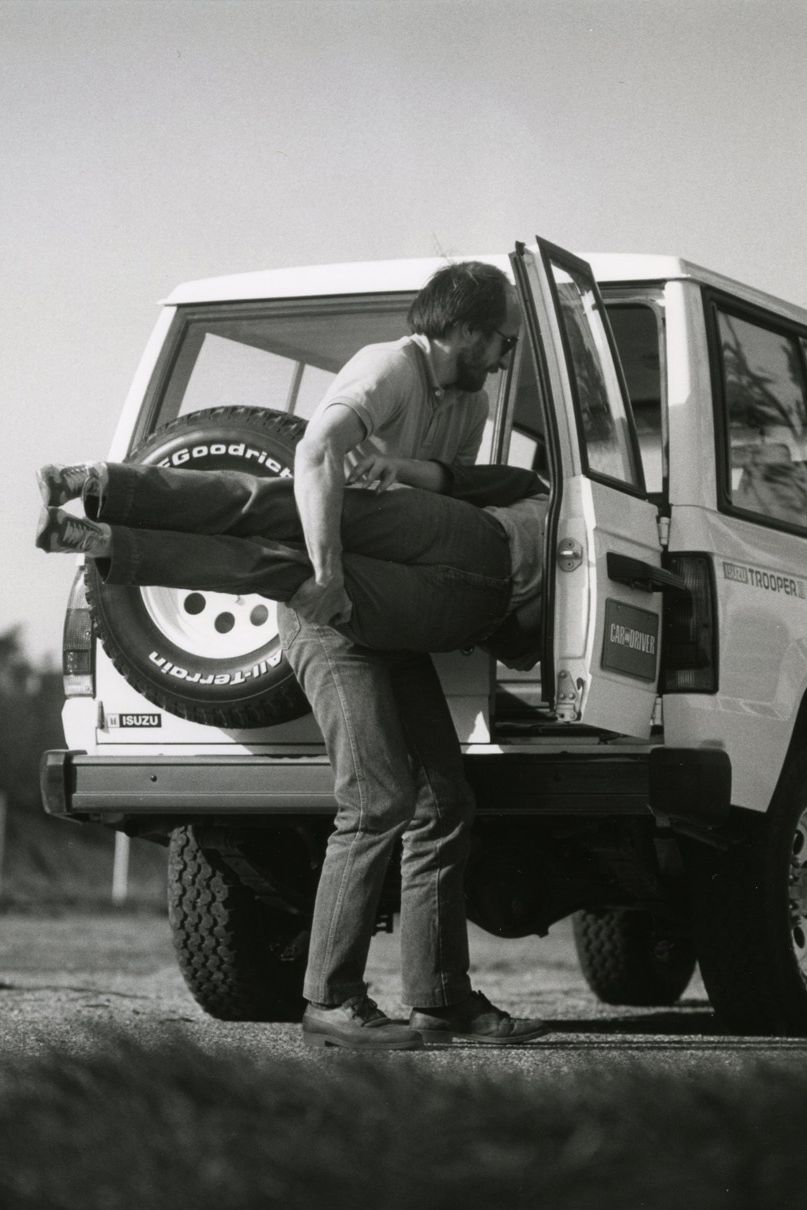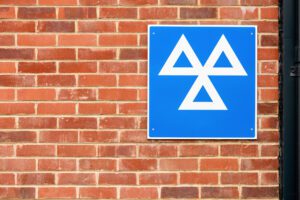From the Archive: 1984 Isuzu Trooper II Tested

From the May 1984 issue of Car and Driver.
White. That was its official color: just white. Not Arctic Afternoon White or Winter Wonderland Memories White or Albion Regal Mist White. Just plain white.
The spectrum of the automotive world pertaining to off-road vehicles shines in numerous bright, sometimes garish colors, but the Isuzu Trooper II beams out the simple white of well-rounded, do-it-all, natural, clean, healthy vitamin-D sunlight.
This is what they call a “ute” in Africa: a utility vehicle. The Land Rover may be considered the prototype. Small ones are a growing phenomenon in America now, with GM, Ford, and Jeep making them and Mitsubishi and, shortly, Toyota importing them. It’s almost a movement, these little do-it-all utes. The big ones have been around for decades—especially Toyota’s Land Cruiser—but there’s suddenly a new wave of them, leaner and neater.
It’s a fresh automotive breeze. You don’t buy one of these to make the scene in the valet line. They cannot provide the kind of performance that lures you out of bed and onto the Crest Highway before dawn on Sunday. Not one of them, in decades to come, is going to be restored for Pebble Beach. But if one of them strays your way, you’ll soon adopt it like a member of the family. And I reckon it will stay adopted; you and your compact utility unit are quite likely to grow gray together.
Isuzu has a nice, friendly little utensil going for it here. The firm’s publicists have dubbed this one Isuzu’s “first convertible,” convertible in the sense that it will perform a lot of different tasks, from recreational off-road four-wheeling to playing the station-wagon role around town to, as they say, touring. Not grand touring, mind you, just touring.
Isuzu has chosen a specific marketing position on the utility-vehicle spectrum, and quite a conservative one at that. This is no monster. You have no hope of gnawing down Annapurna with your knobbies. You’re not going to yank stumps or herd caribou with this one. Your neighbor’s kid isn’t going to add six shocks and jack it up seven feet. You won’t see a funny-buggy version winning Baja.
But you will jump into the Isuzu Trooper for the supermarket trek when snow has the power lines down. You will throw boots and bags and maybe a pack of Scouts into the thing, and if they’re all muddy, you’ll just chuckle. You’ll be happy to invite the dog into the back to go to the vet (he’d be one of those amiable, hair-in-the-eyes, shaggy, family-type dogs; the Trooper is that sort of vehicle). Lots and lots of fresh-caught fish and retrieved ducks could ride home with you, causing no distress to the next person to drive it. And you’ll be absolutely content to take it to work every day, puffing away on your pipe like a geology professor.
The Trooper II is essentially the familiar P’UP (a.k.a. Chevy LUV) pickup. You don’t realize this at first, as the body design is completely different, but almost everything under the squarish steel skin—chassis, suspension, engine, driveline—is either identical or very similar to the short-wheelbase Isuzu P’UP four-by-four. Indeed, it is being imported as a truck, not a car. That’s why the three-person rear bench seat is a $300 option. Isuzu has chosen to pay the 25-percent truck duty instead of lumping the approximately 15,000 Troopers they hope to sell this year into their (meager) share of Japan’s “voluntary” import quotas.
This is not as new a vehicle as it may appear to U.S. eyes. It’s been on sale since 1981 under various names in various places—Jackaroo in Australia and Chevy Trooper in Guatemala—though with a 1.8-liter engine instead of our emissions-controlled 2.0-liter.
Why is it “II”? Well, as explained by Paul Geiger, product-development manager at American Isuzu Motors, the “two” designates the truck version. “One” is the automobile version, meaning it has a rear seat as standard as well as certain other features. America should be getting that as soon as the quotas are de-volunteered.
Geiger also points out that our tester is only the first of a regular line his department is planning. By mid-summer we should be seeing a much more elaborately equipped model. It will have as standard equipment the power steering and air conditioning that are extra-cost items on the base version, plus a “decor package” that includes a tach and other gauges, a higher-performance radio/cassette unit, a center console, and a rear wiper/defogger system.
Further down the road, we may see a four-door body style, a five-speed transmission (Isuzu currently offers a five-speed only in its 2WD trucks), and a larger engine.
Even without all the upcoming goodies, the base Trooper II is a very appealing ute. It may be a little short of power, but that’s about the only significant drawback it shows when you put it through all the paces Isuzu has planned for it in this country. Like the pickup, the Trooper II comes with a choice of gasoline and diesel engines. The gas burner, which we tested, is an Isuzu mainstay, the same 1950cc SOHC unit sold in the P’UP and the Impulse, though in the latter’s fuel-injected installation it pumps out eight more horses.
Aaron Kiley|Car and Driver
Power is the one mechanical point that may give potential purchasers pause. The gas Trooper’s 82 horsepower at 4600 rpm and 101 pound-feet of torque at 3000 rpm frankly place it toward the lower end of its class’s performance curve, as most of its competitors offer another 25 percent or so, at least as an option. The pushrod oil-burner is somewhat more competitive in its field, with its 2238cc, 62 horsepower, and 96 pound-feet of torque.
Unhappily, you don’t get 25 percent better gas mileage to fill in the performance gap when you choose Isuzu. EPA numbers are a rather unimpressive 21 mpg city, 27 mpg highway. C/D observed mileage through several tankfuls (it has a smallish 13.2-gallon capacity, by the way) ranged from 17 to 22 mpg, with a 21-mpg average. That’s merely in the ballpark with other similar four-by-fours.
While the engine reminds us of that old laxative slogan “It works without embarrassing urgency,” the relative anemia is not a serious handicap. The rather tall, boxy vehicle will run down the freeway at about 60 mph in an adequately relaxed manner. It’s quiet enough, too, and only occasionally do you wish somebody had installed fifth gear at the bottom of that tall stick since the last time you absent-mindedly tried for it.

Aaron Kiley|Car and Driver
At around-town speeds, there is ample acceleration. You’re not going to shut down any Rabbit GTIs, but you can often vanquish people who don’t realize they’re racing. If you’re brutal about your clutch work, you can even chirp a rear tire in first gear. (There is no limited-slip differential.)
Off paved roads and even off roads of any kind, the Trooper will cruise along in fine style, even at 7000-foot altitudes. There isn’t enough excess torque to do much in the way of booting the tail out, but we found we were able to churn up any gradient that took our fancy. Power, in other words, was no delimiter of where we wanted to go.
The only kind of driving that really starts you thumbing through the turbo-kit catalogs is a long mountain ascent. This is an exercise that brings back the old VW Microbus days. Remember rowing between third and fourth to try to squeeze just l mph more out of the old girl?
It seems to us that the basic Trooper II package would be almost as versatile and useful as the old bus, too. Isuzu has crammed a cavernous volume into a box that’s just slightly larger (in length and width) than that of the Chevrolet S-10 Blazer. The rear seat folds and folds again to the point of nearly vanishing, leaving you with a high ceiling and a low, entirely flat load floor. The spare tire lives outdoors. As for access, if the one rear door isn’t wide enough, there’s always the second, smaller one.
The official payload rating is 1222 pounds, and Isuzu claims 70 cubic feet for the cargo volume. In real terms, this turns out to be enough for all of Aaron Kiley’s photo gear plus Larry Griffin’s weekend luggage. Stupendous!
Driving the Trooper is a mild pleasure at all times. Like so many Japanese products, this one is laid out in a way that puts one at home immediately. What little instrumentation there is is right there ahead, though we must complain about one indicator that’s a little too visible. The blue high-beam light glares out like a laser during night driving. Bring on the masking tape.
Outward visibility is exceptional in all quadrants, which accounts in part for why jaunts around town are so effortless. The other part of that equation is the ease and honesty of all the controls. In finalizing the Chevy S-10 Blazer, it seems as though the engineers deliberately tried to create the ergonomic illusion of a larger, heavier, more powerful vehicle. The Isuzu, by contrast, is light, almost delicate to operate in every respect.

Aaron Kiley|Car and Driver
The Trooper’s real claim to fame, however, is not only its functional interior but also its impressive ride. For a four-wheel-drive vehicle, this is about as plush as it gets, yet there was no hint of the springs being too weak or the shock absorbers too limp. There was no flopping around in the hardest cornering we attempted. Nor does the Trooper seem to hobbyhorse longitudinally or wobble laterally while running straight on some surfaces, as the S-10 Blazer sometimes does. Altogether pleasant.
Handling is entirely benign. At the limit, understeer calls a halt to higher cornering speeds on either pavement or dirt. On the latter, engaging the front driveline merely reduces the magnitude of the push without seeming to result in any more speed around the corner. The tires, beefy B.F. Goodrich All-Terrain rubber, worked beautifully on both dirt and pavement, displaying no nasty quirks and being next to silent at all times.
The primary limitation on cornering, in fact, is the driver’s seat. If you’re spinning doughnuts to the left, all of a sudden you’re going to fall off, laughing like a hyena into the ravine between the seats. . .
There’s a lot of value here. At an estimated base price well below $9000, the Trooper II is bound to become a member of a lot of American families.
Arrow pointing downArrow pointing down
Specifications
Specifications
1984 Isuzu Trooper II
Vehicle Type: front-engine, rear/4-wheel-drive, 5-passenger, 3-door wagon
PRICE
As Tested: $13,199/$9850
Options: air conditioning, AM/FM-stereo radio/cassette, power steering, rear seat.
ENGINE
SOHC inline-4, iron block and aluminum head
Displacement: 119 in3, 1950 cm3
Power: 82 hp @ 4600 rpm
Torque: 101 lb-ft @ 3000 rpm
TRANSMISSION
4-speed manual
CHASSIS
Suspension, F/R: control arms/rigid axle
Brakes, F/R: 9.8-in vented disc/10.0-in drum
Tires: B.F. Goodrich All-Terrain
P225/75R-15
DIMENSIONS
Wheelbase: 104.3 in
Length: 174.2 in
Width: 65.0 in
Height: 70.1 in
Passenger Volume, F/R: 50/44 ft3
Cargo Volume: 45 ft3
Curb Weight: 3220 lb
C/D TEST RESULTS
30 mph: 4.4 sec
60 mph: 17.4 sec
1/4-Mile: 20.5 sec @ 64 mph
Top Gear, 30–50 mph: 12.1 sec
Top Gear, 50–70 mph: 18.6 sec
Top Speed: 85 mph
Braking, 70–0 mph: 210 ft
Roadholding, 300-ft Skidpad: 0.64 g
C/D FUEL ECONOMY
Observed: 21 mpg
EPA FUEL ECONOMY
Combined/City/Highway: 23/21/27 mpg
C/D TESTING EXPLAINED



